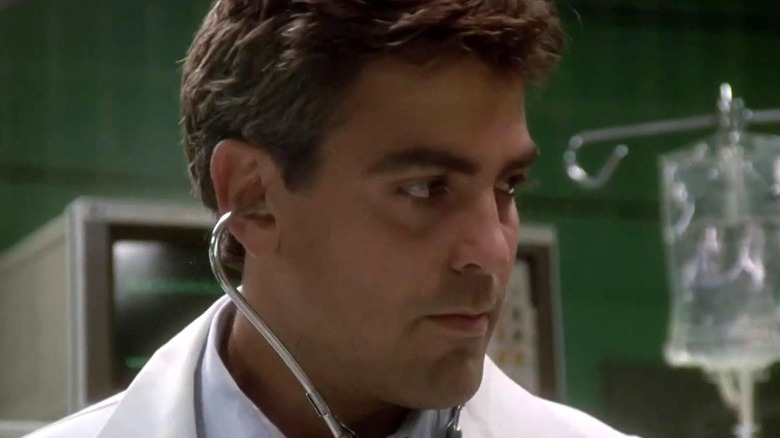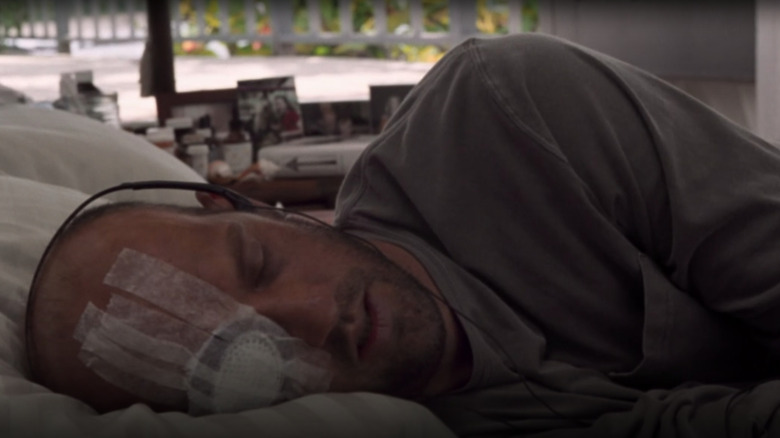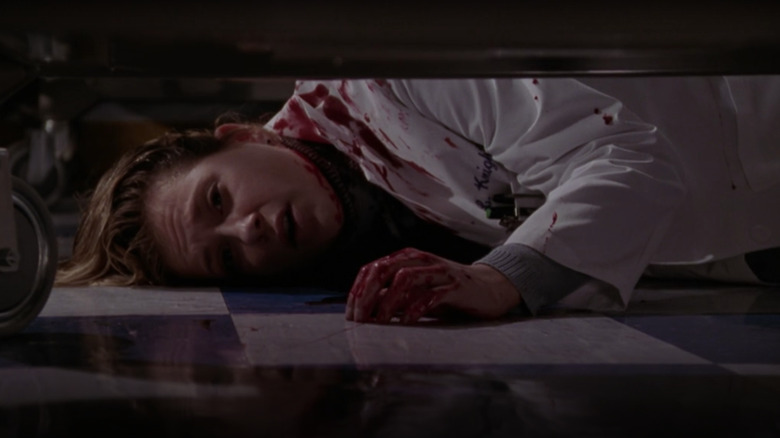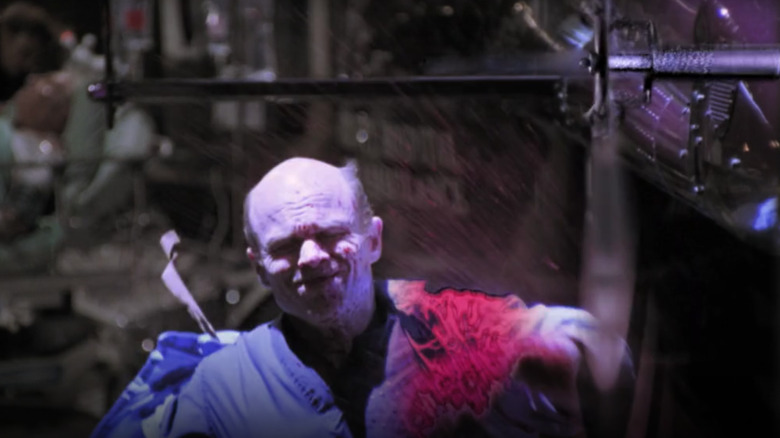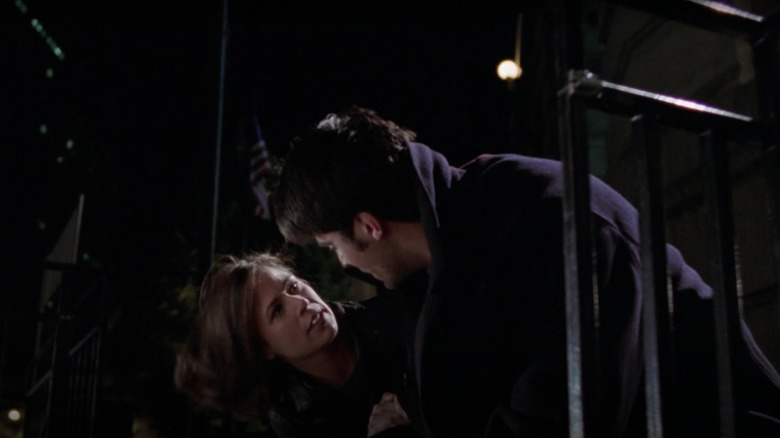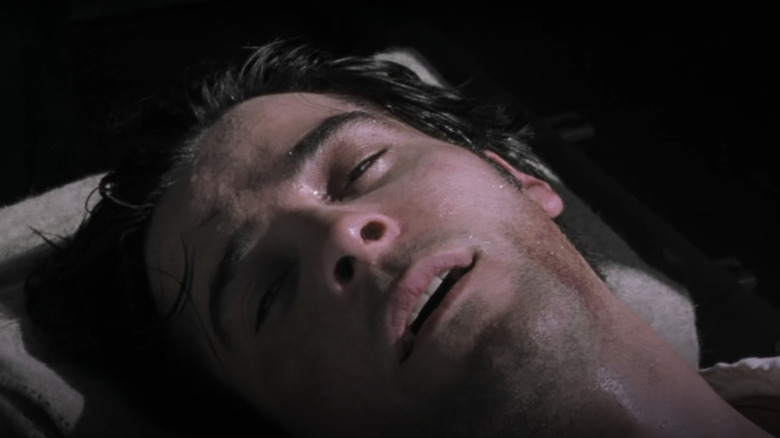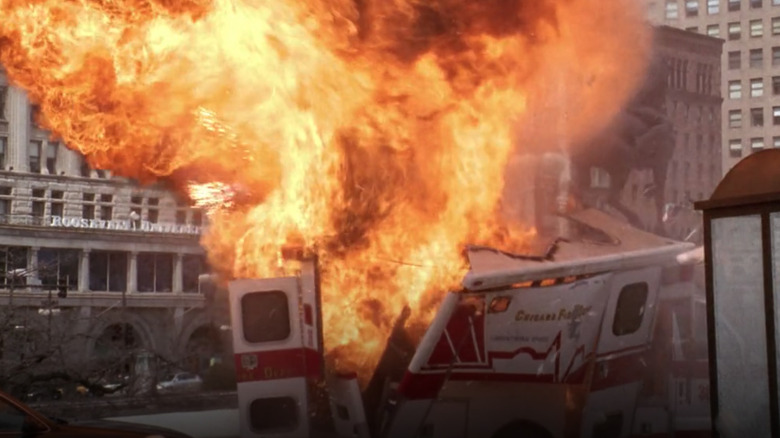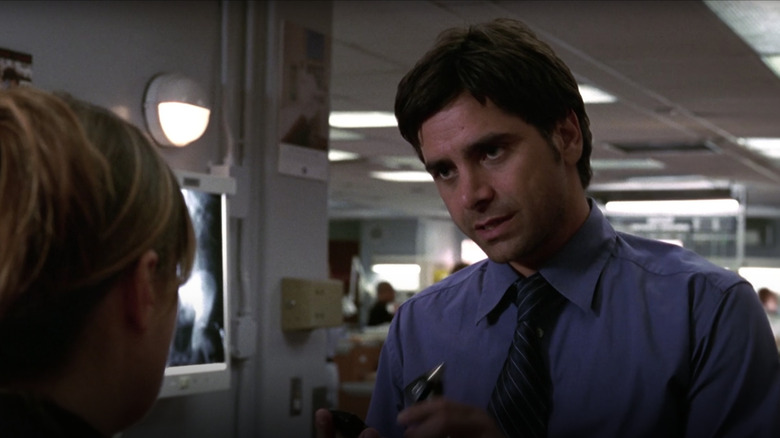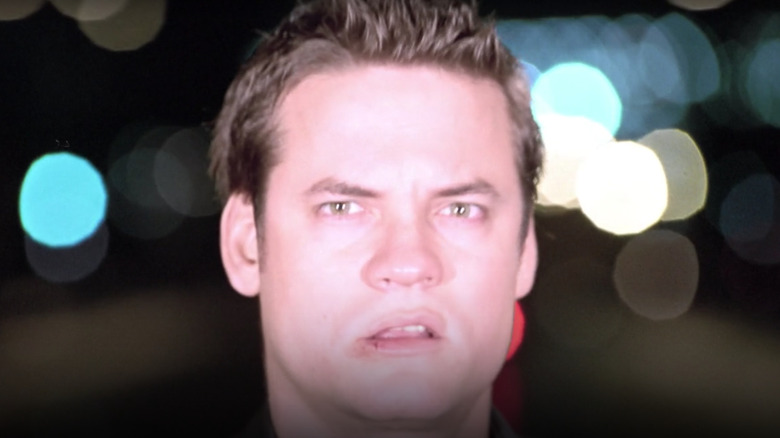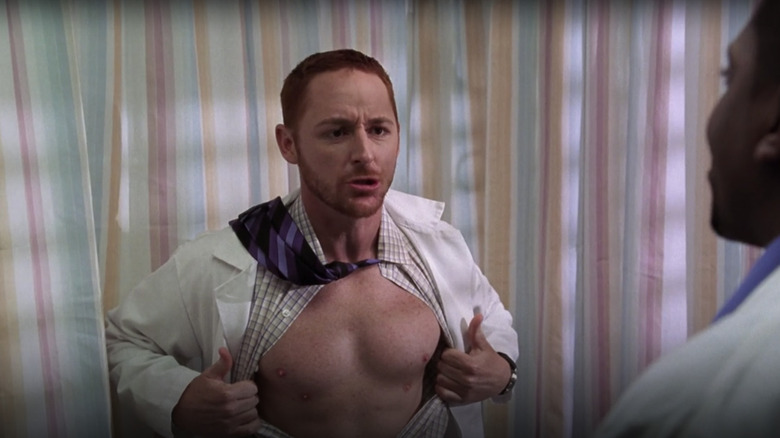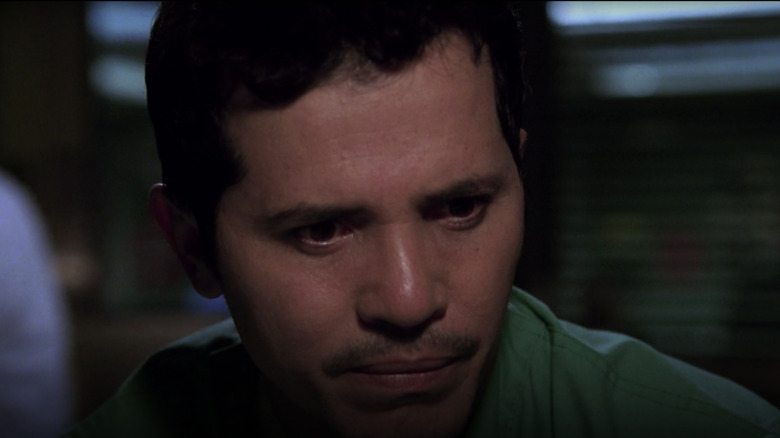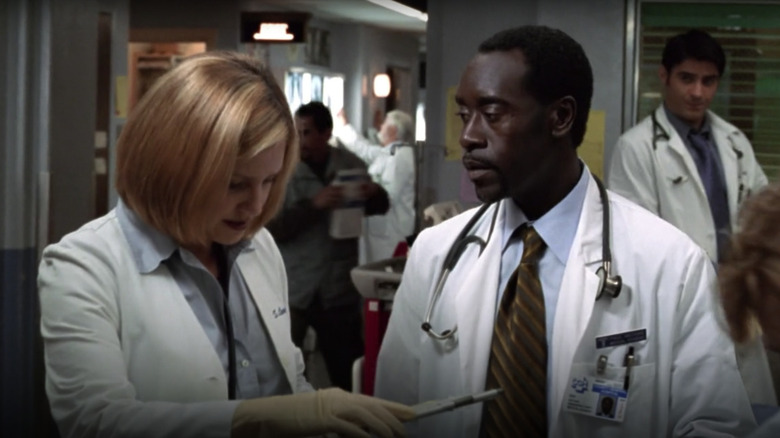Times ER Went Too Far
"ER" remains a benchmark in television, a splendid medical drama featuring lovable, relatable characters, engaging plots, and an intensity few shows have matched. The series made stars out of previously unknown actors such as George Clooney, Noah Wyle, Julianna Margulies, Sherry Stringfield, Eric La Salle, Maria Bello, and Goran Visnjic, many of whom went on to fame and fortune on the big and small screen.
The medical drama also paved the way for similar shows such as the extremely popular "Grey's Anatomy" and "The Good Doctor," both of which happily apply the "ER" aesthetic to their respective series — and, in many ways, redefined the very notion of the action drama.
Created in September 1994 by none other than Michael Crichton and Steven Spielberg, "ER" ran for 15 seasons, won 22 Emmy Awards (out of the 124 the show was nominated for), and, at its peak from 1996-97, drew roughly 30 million viewers. The Season 2 episode "Hell or High Water," in which Clooney's Dr. Ross races against a storm to save a young boy, garnered a massive 48 million viewers — the most for the prolific series, and among one of the most watched episodes of all time.
Yet all good things eventually come to an end. Its early popularity gave way to a steady decline, leaving the show's writers scrambling for interesting storylines and characters in an attempt to return "ER" to its former glory. And while some of the later-season additions were actually quite good, several others fell flat, or pushed the level of credulity that had once served as the series' backbone.
Here are some of the moments when "ER" went too far with its storytelling and characters.
Mark Greene's Hawaii vacation
Anthony Edwards' Dr. Mark Greene served as "ER's" emotional core from the moment he stepped onscreen in the show's 1994 pilot episode. During that time viewers watched him engage with patients, struggle with romance — notably with fellow doctor Susan Lewis — and deal with everything from beatings, administrative duties (which put him at odds with some of his fellow workers, including his friend Dr. Ross), shootings, and other dangerous shenanigans that befell the staff at County General.
After Season 7, Anthony Edwards decided he wanted to spend more time with his family and asked to be written off the show. The writers obliged and Greene promptly exited stage left following a brain tumor, making him the only original "ER" character to bite the dust.
Greene's death remains a powerful emotional beat for the series, and had the writers let the character move on following the episode "Orion in the Sky," which saw him experience his final day in the hospital, all would have been perfect. Instead, we were given another episode, titled "On the Beach," that features Greene spending his final days in Hawaii trying to reconcile with his daughter Rachel (Halle Hirsh) and spend time with his second wife, Elizabeth Corday (Alex Kingston). He eventually succumbs to his illness and dies following a couple of dream sequences in the ER, scored to Israel Kamakawiwoʻole's "Somewhere Over the Rainbow."
Many viewers love "Beach" for its poignancy, and consistently rank the episode amongst "ER's" best. However, in terms of storytelling, the tender, subtle beats of Greene's final days at County General were the perfect way to say goodbye to such a beloved TV icon, while "Beach" feels like an exercise in overkill.
Lucy Knight's tragic death
Lucy Knight (memorably played by Kellie Martin) entered "ER" as a foil for John Carter, and the duo constantly — often hilariously — butted heads throughout Seasons 5 and 6. Eventually, the pair learned to work together harmoniously, and even shared a brief romance before Carter (and Wyle) axed the idea on account of his position over her.
Despite the intrigue brought about the by the odd couple, Martin asked to leave the show after two seasons, purportedly to be closer to her husband, so the writers decided to kill off Lucy in one of the more shocking season finales in TV history.
Titled "Be Still My Heart," which aired on Feb. 10, 2000, the episode sees Lucy and Carter stabbed by a mentally ill patient in gruesome fashion. The characters are found in the mid-season premiere, "All in the Family," and while Lucy initially seems okay, she eventually succumbs to her wounds and passes away in heartbreaking fashion, leaving Carter to reconcile with her death.
As is, this particular beat works extremely well, but it also leans a little too hard on shock value — and, oddly enough, overshadows anything Lucy achieved during her brief run on the show. What's more, her gruesome death set a precedence many shows have since followed: Rather than take the time to write a character out of a series in a believable way, simply kill them off in as shocking a manner as possible to overcompensate for storytelling deficiencies.
Romano vs. the helicopter(s)
Arguably one of "ER's" most disliked characters, Dr. Robert Romano was a hot-headed, belittling man who made everyone's life at County General a living hell. First introduced in Season 4 before stepping into a recurring role in Season 6, Romano's overall demeanor and lack of redeemable qualities made him a perfect foil for one of the show's most outlandishly violent moments.
While attending a patient during the Season 9 premiere, "Chaos Theory," Dr. Romano accidentally stumbles into a helicopter propeller that literally saws off his arm, spraying blood over his stunned co-workers. The moment consistently ranks among the most shocking created by the show but ultimately feels a little too mean-spirited, even for a character as vile as Romano.
Yet the writers weren't done. Despite subjecting Romano to a series of story beats based around his weakening arm, eventually leading the character to amputate his appendage, the show then decided to kill the character a season later in the episode "Free Fall," during which, ironically enough, a helicopter falls off a roof and crushes him. Unfortunately, the bit lands with a thud and induces more laughs than shock, and worse, feels more like a ploy to get Archie — who Romano caught smoking marijuana — off the hook.
If that weren't enough, none of the characters on the show seem to give two squats about Romano's grisly demise. Only Corday shows up for the man's funeral. Later, when asked if he cared about Romano, even Carter responds with a sharp "No." Yikes!
In other words, Romano's entire sexist, bigoted character felt like nothing more than a cheap way for the writers to induce "ER" with a few "shocking" (if not hilariously over-the-top) twists without incurring any substantial fallout.
Luka Kovač's random out-of-character beats
In terms of beloved "ER" characters, Dr. Luka Kovač, played by Goran Visnjic, ranks among the top. An all-around good guy with a strong moral center, Luka joined the show in Season 6 as the show's eye candy following Doug Ross' exit. And while he never achieved the rock star level earned by Ross, many will agree that Luka certainly helped audiences move on from Clooney's beloved character.
Perhaps that's why it was so shocking to see the kindest physician at County General engage in a series of bizarre moments that seem relatively out of character. To start, while on a date with Abby Lockhart (Maura Tierney) in Season 7, Luka takes down a mugger. Perfectly harmless, right? Well, Luka doesn't just beat up the mugger, he violently slams the would be assailant's head into the pavement multiple times while Abby pleads for him to stop. The mugger dies, and Luka more or less realizes he needs to seek help with his PTSD.
Later, in Season 9, following his breakup with Abby, amongst other personal issues, Luka starts calling on sex workers for pleasure. One could argue that the doctor's past relationships led him down this particular road, but it's still an odd path for the writers to take considering his pre-established moral compass.
Luka in the Congo
By Season 10, "ER" was still a relatively strong show, but some perplexing decisions started to creep in as the writers struggled to find interesting directions for the characters.
Case in point: the whole bit in which Luka and Carter travel to the Congo to achieve personal growth that starts at the end of Season 9 and carries on through most of the following season. Carter initially returns home in the Season 10 premiere, but must return to the Congo when he learns Luka was kidnapped and possibly killed by rebel soldiers. In the next episode, titled "The Lost," Carter searches for Luka's body and learns via a lengthy investigation — and a series of flashbacks — that he's actually alive.
How did the good doctor survive his predicament? Well, as it turns out, during his foray in the Congo, Luka contracted malaria and, at one point, prayed for his life. This, along with a cross given to him by one of his cohorts, led the rebel soldiers to believe Luka was a priest and thus spared his life.
Yup, in a turn of events ripped straight out of "Return of the Jedi," a violent group of rebel soldiers spares the life of a main character because they believe him to be a holy relic of sorts. As such, he survives long enough for Carter to find and save him from the violent rebels and a horrible disease.
The whole Africa storyline made for an interesting change of pace from the doldrums of the ER, particularly in the way the show bounced back and forth from County General to Carter (who stayed behind after saving Luka) throughout the season. Yet Luka's entire ordeal, while rather intense and mostly well executed from a technical perspective, felt more like a contrived way to get Carter out of the hospital than a necessary (or realistic) subplot.
Dr. Pratt's explosive demise
Following eight seasons on "ER," Dr. Charles Pratt, Jr. (played by Mekhi Phifer) jumped in the back of an ambulance with a government informant played by guest star Steve Buscemi. Unfortunately, the vehicle had been rigged with bombs by the Turkish mob, resulting in a violent explosion that killed off both characters.
Of course, fans had to wait until Season 15 to find out for sure whether Dr. Pratt would pull through, which felt like yet another cynical ratings ploy rather than a necessary story beat — particularly since Season 15 would mark the show's last. Why develop Pratt from a hardheaded intern to a mature doctor only to kill him off right before the final season?
As explained by Phifer in an interview with Vulture, the decision was mutual between himself and the writers: "I had a great run on the show. But ... by the time I got there, even though the show hadn't lost any of its quality, it just wasn't getting recognized anymore."
Sure, but where early "ER" characters such as Doug Ross, Peter Benton, and Carol Hathaway enjoyed suitable exits that saw them simply move on from County General, as many do in real life, later season fan favorites, such as Pratt, were used more as fodder to keep viewers interested.
Here's an idea: rather than rely on shock tactics, simply insert good characters into good storylines.
Everything to do with John Stamos
In its later years, "ER" attracted plenty of A-class talent, resulting in some truly exciting guest appearances. However, declining ratings following the departure of Anthony Edwards led the showrunners to try a soft reboot of sorts in the hopes of turning viewership around in Season 13.
New cast members were added, including John Stamos' Tony Gates, who had made guest appearances on the show in the season prior, but graduated to a recurring role in Season 13. Unfortunately, Stamos felt more like a celebrity stunt than a necessary addition to "ER," mostly due to the way his personality too closely mirrored the likes of Doug Ross and Luka Kovač as the ER's token heartthrob.
Gates was lazily handled and, even worse, boring. Compared to other late-series additions, including Linda Cardelleni's Samantha Taggart and Stanley Tucci's Dr. Kevin Moretti, Gates was one of the least successful to join the sprawling cast, ultimately another example of the show going a little too far in its pursuit of viewers.
Patient drives a tank at the ER
In one of "ER's" more peculiar scenarios, a patient (played by guest star James Leo Ryan) goes bananas after Dr. Morris refuses to subscribe pain medication and proceeds to commandeer a tank in the hopes of punishing the staff at County General.
Said episode, titled "Forgive and Forget," set during the tenth season, is actually more memorable for featuring a notable guest appearance by Jessica Chastain, making her acting debut as a young woman taking care of her bed-ridden father, as the tank bit never achieves the dramatic tension it aspires to. In fact, it ends with a whimper as the patient never reaches the ER and is quickly taken out by the police after smashing a few cars and an ambulance all while a relatively subdued staff watches from afar.
While certainly an intriguing premise, the tank aspect of "Forgive and Forget" feels less like a moment of inspiration and more like one of the writers stumbled upon a tank on the Warner Bros. studio lot and decided to put it to good use. It's neither hilariously over-the-top nor realistically plausible, resulting in a forgettable bit of TV that's more yawn than yarn — and another example of the writers trying a little too hard to pack "ER" with needless TV action.
Ray Barnett loses his legs
Season 13 saw "ER" take things a little too far, specifically with Ray Barnett, played by actor Shane West, a character who never quite fit on the show due to his eccentric persona and rebellious, devil-may-care attitude. His on and off again relationship with Dr. Neela Rasgotra felt half-baked, and the various subplots involving his person were tedious at best.
Apparently, West felt the same way and more or less asked to leave the show in order to pursue a series at Fox titled "Supreme Courtships." The actor was also trying to piece together an independent film called "What We Do Is Secret," a project that conflicted with his stint on "ER."
"I did 'ER' for three years, so during the hiatus, I worked on shooting bits of 'What We Do Is Secret,' getting more financing and trying to put it together," he explained. "I was trying to just film one damn movie, but that's the heartache of independent films."
As a means to oblige the actor's desires, the writers had Ray drink himself to a stupor following a spat with Neela at Luka and Abby's wedding in the episode "I Don't," and get hit by a truck walking home. Considering the death toll among the County General staff at this point in the show, Ray's tragic accident felt like overkill.
To their credit, the writers didn't actually kill off Ray, but, rather, shipped him off to Baton Rouge, La. He returned for a brief stint in the final season with prosthetic legs and a newfound love of life. All's well that ends well, but there's simply too much drama at this particular hospital for viewers to deal with.
Archie Morris' four nipples
Archie Morris became a fixture on "ER" early in Season 10 and served mostly as comic relief thanks to his carefree attitude and marijuana-smoking antics. As played by Scott Grimes, the character mostly works, even if his sudden transformation to mature Chief Resident never fully jives with the show's semi-realism.
Still, over the course of 100+ episodes, you're bound to have a few moments that take things a little too far. In this case, the Season 12 episode "Split Decisions" sees Archie reveal a secret to Dr. Pratt: he has four nipples.
Now, the extra nipple bit is actually more common than one might think, with a slew of celebrities boasting more than two on their person, but, in terms of Archie, the moment felt a little too on the nose. What are the chances that the most eccentric person in the ER has more than two nipples? This revelation would have felt more realistic had it come from someone a little less obvious, but with Archie it feels like a moment when the writers went a little too far for comedy.
Victor Clemente's descent into madness
Everyone loves John Leguizamo, but everyone will also tell you the actor's brief stint on "ER" was ill-conceived and extremely bizarre. The actor appeared on the show for 12 episodes as Victor Clemente, a doctor with an extremely problematic personal life that eventually impacts his job.
Throughout the season we see Clemente reunite with his girlfriend Jodie (Callie Thorne), who leads him down a path filled with drugs and violence. At one point, Jodie's husband Bobby shoots her and Clemente, then proceeds to stalk the latter with unusual determination. This leads to Clemente falling in an altered psychiatric state as a result of sleep deprivation and stress, during which he urinates in public, causes property damage, and becomes more violent.
His credentials allow Clemente to dance around any sort of punishment — and clash often with Luka — but eventually he goes too far and is removed from his position.
While the inclusion of a doctor with a checkered past is par for the course for "ER," Clemente simply felt too outlandish for viewers to get behind. A more subtle rout that didn't involve guns or a number of ridiculous public stunts might have actually paid off. As is, Clemente came across like another celebrity stunt that seriously hampered an otherwise good season.
Don Cheadle's Parkinson subplot
Don Cheadle's inclusion on "ER" certainly looks good on paper. After all, the man is a living legend and one of the finest actors working in the industry today. Unfortunately, he was wasted in Season 9 of the medical drama playing Paul Nathan, a medical student suffering from Parkinson's.
Now, keep in mind, Paul didn't start practicing medicine until after he was diagnosed with his condition, which seems foolhardy at best. Cheadle does what he can with the material, but the entire subplot feels forced and more than a little contrived. An aspiring surgeon who can't use his hands?
To make matters worse, Paul constantly clashes with Dr. Corday, who (justifiably) won't allow him to perform surgery. As a doctor, you'd think Paul would understand how his condition puts patients in harm's way; instead, he refuses to heed Corday's rule and is subsequently kicked off the surgical rotation. Again, it's easy to see where the writers were going, but the storyline simply makes no sense — and once again feels like the show reaching too hard for dramatic tension.
